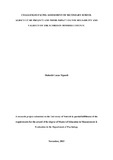| dc.description.abstract | The study was conducted to determine the challenges facing assessment of K.C.S.E agriculture project and their impact on reliability and validity of student scores in agriculture.
The study employed a descriptive research design of correlation type where the relationship between project scores and final scores was analysed. The study targeted 30 principals, 30 teachers of agriculture and 547 candidates (2014) who sat for agriculture from 30 schools in Mombasa County.
A questionnaire was used to collect data on perception of principals and agriculture teachers towards factors influencing the assessment of K.C.S.E agriculture project as a challenge, while Kenya National Examinations Council (K.C.S.E) printouts and manual mark sheets were used to collect data on candidates’ final scores and project scores respectively.
Data collected was compiled into two data files, one for data on perception of principals and agriculture teachers and another on project and final scores.
The data files were subjected to descriptive statistical procedures namely frequencies, measures of central tendencies, particularly the mean, measures of dispersion such as standard deviation; and inferential statistical procedures mainly , t-tests, correlations, regression and analysis of variance using SPSS software in order to make conclusions.
The study revealed that principals rated 91% of the factors as serious while teachers rated 56.53% as serious and 4.35% as very serious.
Although principals reported a higher mean perception score of 2.77 compared to the teachers at 2.69, the study did not reveal a statistically significant difference between principals and agriculture teachers (t=0.0613, df=44, p>0.05). Principals (M=2.77, ơ = 0.398) did not report a significantly higher score than agriculture teachers (M= 2.69, ơ =0.543).Project scores were found to correlate positively with final score but with only a medium coefficient (r=0.457, p<0.001).An analysis of variance to determine the predictive power of project scores on the final score yielded a test statistic F=60.27,p<0.001 and an R2 value of 0.208 implying project scores predict approximately 21% of the final score | en_US |

